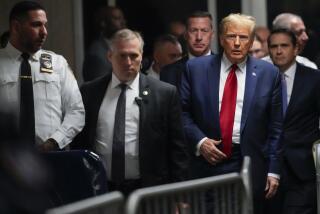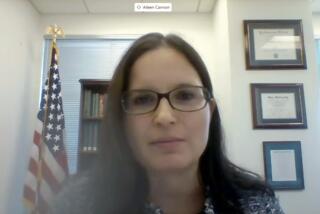Court Rejects Plea for Delay in Start of Key Insider Trial : Three Arrests May Have Been Hasty, Prosecution Admits
- Share via
NEW YORK — In an apparent setback to the government in a key insider trading case, a federal judge Tuesday rejected a prosecution motion to delay the trial of three Wall Street stock traders for two months.
As a result, the trial against Robert M. Freeman, Richard B. Wigton and Timothy L. Tabor is scheduled to begin May 20. U.S. Atty. Rudolph W. Giuliani had asked for the delay on grounds that his office was seeking a superseding indictment against the defendants and did not expect it to be handed up until the first week of June.
Defense attorneys said the trial order by U.S. District Judge Louis L. Stanton may prevent the prosecution from obtaining the new indictment at all.
A new indictment “would raise a double jeopardy question,” said Stanley S. Arkin, the defense counsel for Wigton, referring to the constitutional protection against being charged twice for the same crime.
But if prosecutors manage to obtain a new indictment before May 20, Arkin acknowledged, that might force a deferral of the trial. Federal prosecutors declined to comment on Stanton’s ruling.
Tabor was arrested at his Manhattan home on the evening of Feb. 11 and spent that night in jail before being arraigned the following day. Wigton and Freeman were arrested Feb. 12 in their offices.
Colleagues Stunned
The arrests stunned the defendants’ colleagues on Wall Street. Assistant U.S. Atty. John M. McEnany acknowledged at Tuesday’s court hearing that the arrests may have been hasty.
“With the benefit of hindsight, I would have liked two to three months more to prepare our case,” he said.
Freeman, Wigton and Tabor are the only defendants to insist on a trial among those implicated in the government’s months-long investigation of trading practices on Wall Street.
Freeman, 44, has been head arbitrageur for the investment house of Goldman, Sachs & Co.; and Wigton, 52, and Tabor, 33, have performed similar functions for Kidder, Peabody & Co., another Wall Street firm.
All three were accused of dealing in inside information by Martin A. Siegel, who for many years was a top mergers specialist at Kidder, Peabody. When Siegel was implicated in an insider trading ring by former stock speculator Ivan F. Boesky, he told authorities that he had swapped inside information with Freeman and that Wigton and Tabor traded on information he gave them that they knew was confidential.
Siegel pleaded guilty to insider trading charges Feb. 13, a day after the three men were charged with illegal trading.
Although coming during a period in which federal prosecutors had successfully persuaded several Wall Street insiders to plea-bargain, the arrests of Wigton, Freeman and Tabor almost immediately raised questions about the strength of the government’s case.
“In my experience, you arrest people like that in the hope they’ll confess quickly,” said one former federal prosecutor now working as a criminal defense attorney in New York. “And you don’t do that if your case is that strong.” The attorney is not involved in the Freeman, Wigton or Tabor defenses.
Other attorneys remarked that, as defined by the indictments of the three men handed up April 9, the government’s case appeared weaker than at the time of the arrests. The only allegedly illegal trades cited in the indictment were three purchases of Unocal options made by Wigton and Tabor in mid-May, 1985, allegedly on inside information about Unocal’s plans for a takeover defense provided by Freeman to Siegel.
Unocal’s plans, however, were made public in the third week of April, meaning that the trades may have reflected public information. Government papers filed at the time of the arrests placed the trades “in or about April, 1985.” The absence of circumstantial evidence so far suggests that prosecutors may be forced to rely on Siegel’s testimony to make their case.
Federal prosecutors have said repeatedly that they would be asking a grand jury for the superseding indictment, covering further allegedly illicit trading. In papers filed Monday, prosecutors said the new indictment would cite the defendants’ trading in as many as nine merger transactions in 1984 and 1985. But, as Giuliani indicated, the prosecutors’ timetable for seeking the new indictment has slipped from mid-May to the beginning of June.
“I think they’re scrambling,” one attorney familiar with the case remarked after a court hearing Monday. “They didn’t do any investigation prior to the arrests, and now they’re stuck with a timetable they’re unhappy with.”
More to Read
Inside the business of entertainment
The Wide Shot brings you news, analysis and insights on everything from streaming wars to production — and what it all means for the future.
You may occasionally receive promotional content from the Los Angeles Times.










